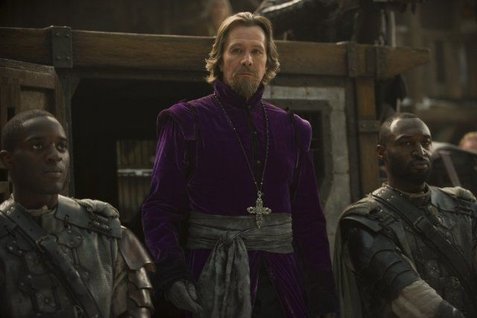Weekly Web Series Review: Baby Cakes
 Brad Neely, perhaps best known for his hilarious “George Washington” and “JFK” music videos, has built an empire of off animatics (still images edited together with dialogue and sound effects). The creator of “Creased Comics” also invented a fictional town called China, Illinois, in which several strange characters reside, including a huge, baby-faced man named Mark “Baby” Cakes. In the series “Baby Cakes,” Neely explores the unique life and philosophy of this probably autistic, mostly gentle giant, and the results are very funny, always absurd, and even sort of profound and sad a surprising amount of the time.
Brad Neely, perhaps best known for his hilarious “George Washington” and “JFK” music videos, has built an empire of off animatics (still images edited together with dialogue and sound effects). The creator of “Creased Comics” also invented a fictional town called China, Illinois, in which several strange characters reside, including a huge, baby-faced man named Mark “Baby” Cakes. In the series “Baby Cakes,” Neely explores the unique life and philosophy of this probably autistic, mostly gentle giant, and the results are very funny, always absurd, and even sort of profound and sad a surprising amount of the time.
The first six episodes of “Baby Cakes” find Baby Cakes transcribing his thoughts on a variety of subjects into his diary. The very first episode sets up a few recurring themes of the series, such as Baby Cakes’ belief that his father and his father’s professor friends are wizards, and his love of fantasy role-playing games. When one of his friends asks him if he’s a virgin, Baby Cakes’ reply is a perfect example of his strangely limited understanding of the world: “I said no, because I can’t give birth to a Jesus.” The episode also sets up Baby Cakes’ recurring songwriting, and some of the later episodes are entirely made of these songs.
The second episode introduces Baby Cakes’ grandfather and explores the relationship between the three generations, and demands a few repeat viewings in order to decipher the ridiculous bathroom graffiti Baby Cakes encounters in a gas station bathroom on the way to his grandfather’s house. The third episode is among the series’ very best, as it is the first one that really captures the sweet, oddly sad philosophy and worldview of Baby Cakes, a self-described “peaceful, sleepy giant making zero a year.” As Baby Cakes walks through the park, reflecting on the world around him, as he sees it, in a unique parlance all his own: “I have a big coat, with big pockets. Sometimes, kittens get in there. It’s cool with me as long as they keep their hook-socks curled.” The episode ends with a wonderful encapsulation of Baby Cakes’ views about life: “Even if my days don’t mean anything, I just hope that I die while hugging, and not while in a wine-drinking contest.”
The sixth episode expands on this strange but surprisingly insightful worldview, and just might be the very best episode of the entire series. It finds Baby Cakes digging up a time capsule he buried as a child, in which he placed his favorite thing and a note to his future self, in which he explains sex: “Sex is a people-spaghetti. Hairy pee-pees clash. They yell, ‘Yes! Yes!’ but their grody faces say, ‘Ouch!’” The rest of the episodes (the non-diary ones) are something of a mixed bag, but there are definitely highlights, and the whole series is only about 32 minutes long, with more brilliance scattered throughout than most full-length television series.
You can follow us on Twitter and Facebook for content updates. Also, sign up for our email list for weekly updates and check us out on Google+ as well.
Posted in: Entertainment, Humor, Videos
Tags: Baby Cakes, Brad Neely, China, comedy, Creased Comics, Ezra Stead, George Washington, Illinois, Jesus, JFK, music videos, television, Videos, web series, Weekly Web Series Review, wizards











